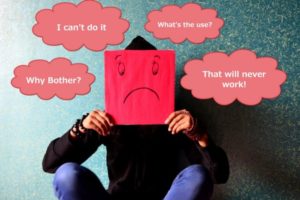
Learned helplessness occurs when an individual feels helpless in the presence of negative stimuli, has accepted that he has lost control and thus gives up trying to change the situation. We’ve all thrown up our hands at times when faced with a seemingly insurmountable challenge. But the pattern of learned helplessness is pervasive for some people, who feel truly unable to impact their world or create the changes they desire in their lives or circumstances. First associated in humans with clinical depression, learned helplessness can affect anyone, including trauma survivors, those who have experienced neglect, discrimination or abuse, and individuals who are incarcerated or otherwise controlled by others. A pessimistic worldview has been reported to be a vulnerability for developing learned helplessness. Learned helplessness also increases stress levels, disruption of emotions demonstrating passivity or aggression, and difficulty with some cognitive tasks, such as problem solving.
To build resilience to falling prey to feelings of powerlessness and lack of agency, develop these skill sets:
1. Increase self-awareness. Train yourself to notice when you are believing or acting from a “victim stance.” Are you shirking accountability? Stuck in self-pity? Refraining from trying for fear of failure?
2. Challenge initial beliefs and responses. As cognitive-behavioral therapy instructs, life is rarely black and white, “always/never.” Ask yourself if this current outcome is universal in ALL cases. Is your response the same across different contexts? Do you truly HAVE options, even though they may be uncomfortable?
3. Look for exceptions. Mine your memory for examples of when you exerted effort and created a desired outcome. Acknowledge the value inherent in just trying something difficult, even if the result is short of what you hoped for.
4. Practice gratitude. A daily gratitude list noting 3-5 things you are grateful for helps skew our perception toward the positive, and we begin more readily noticing what is working well or what is a blessing in our lives.
It’s OK to recognize that we can’t always achieve every goal, or cause a result that pleases us. But we CAN always try, even when it’s scary, likely to fail, or we doubt ourselves. Indeed, the simple risk inherent in attempting something new or difficult rewards us with a sense of empowerment and courage. As Marianne Williamson wrote, “Our deepest fear is not that we are inadequate. Our deepest fear is that we are powerful beyond measure.”
